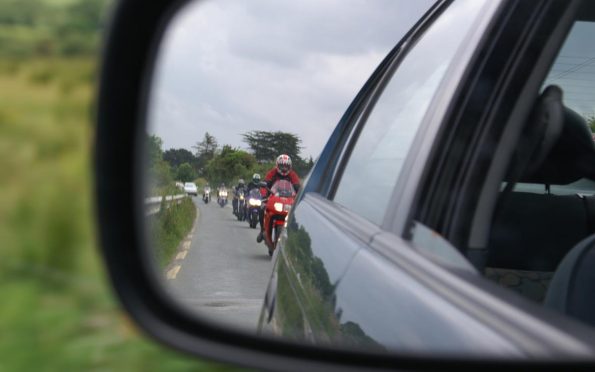Getting out and riding in a group with your mates is a fine way to spend a sunny day. Here are some tips to make your motorbike ride both fun and safe.
Group dynamics
It’s best if all riders are at a similar riding level on bikes with similar performance, and that the group size is small to avoid holdups.
If you have riders that are inexperienced, they will hold the rest of the group up – the group can only make progress at the speed of the slowest rider. A slow rider will frustrate faster riders.
Depending on the type of riding you are doing, if one person has a bike that doesn’t have the performance of the other bikes, they will drop off the back of the group and might take risks to try to keep up.
It’s difficult for vehicles to overtake a large group of motorbikes (not that this is usually the case), but it’s also challenging for a large group of motorbikes to make their way through traffic, too.

A group of bikers can stack up behind slower traffic, or get split up when riding through lots of traffic
Objectives
What is the reason for the ride? Is it to visit a specific town? Is it to ride a specific interesting road? Do you have to be somewhere at a certain time? Is it to improve skills? Make sure everyone knows why the ride has been organised.
If it’s your first ride of the year after a break over winter, make sure that you’ve had a bit of practice beforehand because group riding can be tiring – there’ll be a longer distance and you’ll be concentrating on maintaining your position within the group. You won’t necessarily be able to stop when you want to because of peer pressure.
Food and drink
Has every rider been to the toilet and do they have a drink and snacks (if required). Riding while thirsty and hungry is distracting. If you plan on getting food and drink half way through the ride, avoid heavy fatty foods and alcohol.
Planning the route
Having a break every 90-120 minutes is ideal so that riders don’t get cramp or fatigue, especially if it’s hot and the road is challenging. The route should be realistic to achieve. Check that there won’t be bad weather, particularly if you’re heading into the mountains. You can use Google Maps to see if there are any problems; it will give you an estimate of the time it will take to complete the route.
Someone in the group should carry a first aid kit. If you’re riding out into the middle of nowhere, a personal locator beacon can be useful, as can leaving details of your route with someone who isn’t going.
Being punctual
Set a meeting time and a departure time. People should arrive before the meeting time with a full tank of fuel (unless you’ve agreed to stop somewhere along the route) so that everyone is then ready to go over the route and do some quick safety checks.
Don’t delay the start of a ride because one of the riders can’t manage their time; it means you’re delaying everyone else. If you’ve already discussed the route, they can catch up.
Road position
Decide who will ride at the front and who will ride at the back, and swap numbers in case there’s a problem. Check that every rider has experience riding in a group and if they haven’t explain the key points:
- Ride in a staggered formation
- Don’t tailgate
- Don’t speed
- What is your overtaking policy?
Riding in a staggered formation is good for straights as it gives each rider more visibility of the road in front, but riders should fall out of staggered formation when approaching corners otherwise half the riders will be on the wrong line.
Put an experienced rider up front as they are responsible for spotting problems and setting an appropriate pace. If you are riding with inexperienced riders, put them in the middle and put another experienced rider behind them.
Riders should not become fixated on the rider in front. They should pick their own lines and their own speed. If the rider in front makes a mistake, any rider fixated on them will likely make the same mistake.
Fuel stops
Every rider should know where the fuel stops are and all riders should arrive at the ride with enough fuel to make it there. Having to make random stops breaks up the group, and people at the head of the pack have to double back to make sure everything is OK.
Leave egos at home (or don’t invite them)
If you’ve got a mate with an ego and something to prove, it’s best they don’t come on the ride.
Speed
Have fun, but don’t break the law. Watch your approaching speeds into tight corners, and be particularly careful if you are filtering through traffic as drivers won’t necessarily be expecting you.
Riding through urban areas
Trying to get a group through an urban area together is difficult because of traffic lights, roundabouts, intersections and other obstacles. Some riders might be comfortable with filtering, and others not. Ultimately the group will get spread out and you’ll need to stop somewhere anyway. Meeting out of the city is more convenient and people can make their way there for the start.
